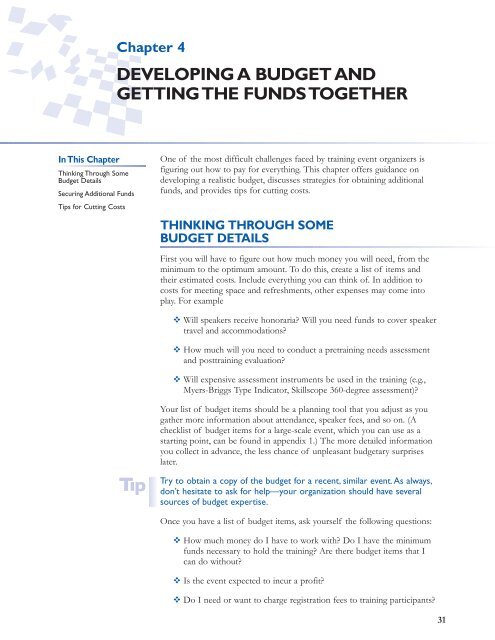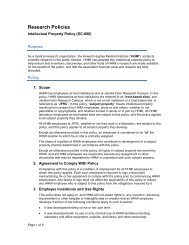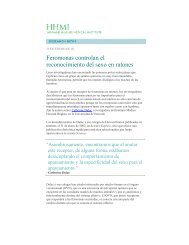Training Scientists to Make the Right Moves - Howard Hughes ...
Training Scientists to Make the Right Moves - Howard Hughes ...
Training Scientists to Make the Right Moves - Howard Hughes ...
Create successful ePaper yourself
Turn your PDF publications into a flip-book with our unique Google optimized e-Paper software.
Chapter 4<br />
DEVELOPING A BUDGET AND<br />
GETTING THE FUNDS TOGETHER<br />
In This Chapter<br />
Thinking Through Some<br />
Budget Details<br />
Securing Additional Funds<br />
Tips for Cutting Costs<br />
At a Glance<br />
“”<br />
QA<br />
One of <strong>the</strong> most difficult challenges faced by training event organizers is<br />
figuring out how <strong>to</strong> pay for everything. This chapter offers guidance on<br />
developing a realistic budget, discusses strategies for obtaining additional<br />
funds, and provides tips for cutting costs.<br />
THINKING THROUGH SOME<br />
BUDGET DETAILS<br />
First you will have <strong>to</strong> figure out how much money you will need, from <strong>the</strong><br />
minimum <strong>to</strong> <strong>the</strong> optimum amount. To do this, create a list of items and<br />
<strong>the</strong>ir estimated costs. Include everything you can think of. In addition <strong>to</strong><br />
costs for meeting space and refreshments, o<strong>the</strong>r expenses may come in<strong>to</strong><br />
play. For example<br />
Chapter One<br />
Will speakers receive honoraria? Will you need funds <strong>to</strong> cover speaker<br />
travel and accommodations?<br />
How much will you need <strong>to</strong> conduct a pretraining needs assessment<br />
and posttraining evaluation?<br />
Will expensive assessment instruments be used in <strong>the</strong> training (e.g.,<br />
Myers-Briggs Type Indica<strong>to</strong>r, Skillscope 360-degree assessment)?<br />
At a Glance<br />
Your list of budget items should be a planning <strong>to</strong>ol that you adjust as you<br />
ga<strong>the</strong>r more information about attendance, speaker fees, and so on. (A<br />
checklist of budget items for a large-scale event, which you can use as a<br />
starting point, can be found in appendix 1.) The more detailed information<br />
you collect in advance, <strong>the</strong> less chance of unpleasant budgetary surprises<br />
later.<br />
Try <strong>to</strong> obtain a copy of <strong>the</strong> budget for a recent, similar event.As always,<br />
don’t hesitate <strong>to</strong> ask for help—your organization should have several<br />
sources of budget expertise.<br />
Once you have a list of budget items, ask yourself <strong>the</strong> following questions:<br />
How much money do I have <strong>to</strong> work with? Do I have <strong>the</strong> minimum<br />
funds necessary <strong>to</strong> hold <strong>the</strong> training? Are <strong>the</strong>re budget items that I<br />
can do without?<br />
Is <strong>the</strong> event expected <strong>to</strong> incur a profit?<br />
Do I need or want <strong>to</strong> charge registration fees <strong>to</strong> training participants?<br />
31
















